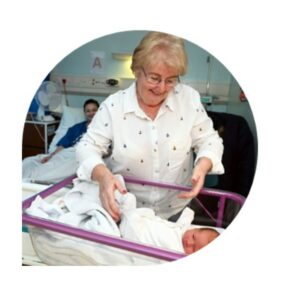Maternity Service Strategy
Maternity Service Strategy
Bedfordshire Hospitals NHS Foundation Trust
2024 – 2029

Introduction
Bedfordshire Hospitals NHS Foundation Trust provides healthcare services to a diverse population of 650,000 people in Bedfordshire and the surrounding areas from two hospital sites: Bedford Hospital and Luton & Dunstable University Hospital.
Maternity services are located on each site. Bedford Hospital has 2700 deliveries per annum and provides community Midwifery care for an additional 600 women per year who deliver in other hospitals. It has a designated Special Care Unit (level 1). The Luton and Dunstable University Hospital has 5500 deliveries per annum and provides community Midwifery care for an additional 200 women per year who deliver in other hospitals. It has a Neonatal Intensive Care unit (Level 3). There is a fetal medicine unit and the Maternity teams work in close partnership with Cambridge University Hospitals NHS maternal medicine hub to deliver physician led obstetric maternal medicine services on site thus supporting the women with high complex pregnancies.
Focusing our resources to improve maternity services to support continuous improvement of the long term health and well-being of women now and for future generations, thereby reducing health inequality in Bedfordshire.
The delivery of Maternity services to a high safety standard is informed by national standards, guidance and regulatory requirements. The Maternity service is committed to responding to national review findings, including the Three year delivery plan for Maternity and Neonatal services NHS Resolution 10 Safety Actions and recognises that listening and responding to all women and families is an essential part of safe and high quality care, to meet quality imperatives and maintain a resilient service. The voice and experience of service users, staff and other Maternity stakeholders in Bedfordshire are key to the development of the strategic direction of travel for the service and the successful implementation of quality improvement activities.
Development of this strategy
This strategy has been developed in collaboration with key stakeholders including staff across all Maternity service staff groups and our service users.
Our staff are our most important resource and have key insights into our service, including their experience working at Bedfordshire Hospitals and ideas for improving the service for women and families. Engagement was sought through a number of forums including ‘Have Your Say’ whiteboards, digital surveys, and clinical pathway meetings.
Listening to our user voice forms an integral pillar of our strategy and was critical to its development. We reviewed previous compliments and complaints, held ‘In Whose Shoes’ events in both Bedford and Luton, and engaged our LMNS and MNVP stakeholders at every stage of the process, including our strategic leadership workshops.
Use of language
One of the key ambitions set out in this strategy is to achieve a shift in organisational culture to one that is truly inclusive and supportive for all. As such, we recognise the range of people that use our services and the many shapes that a family can take. In this strategy, we have primarily used the term ‘women’ to refer to our service users, in line with national maternity strategy documentation. However, we acknowledge that not all birthing people may identify as women, and affirm that this strategy aims to promote the excellent care for all service users, regardless of gender.
Vision Statement
Our vision statement will be decided by our stakeholders, who have been integral to the development of this strategy.
To provide exceptional Maternity care and be an inclusive place to work, committed to delivery on the national ambitions.

Key enablers in delivering our Maternity strategy
We have 5 core enablers that will support the delivery of our Maternity strategy:
Communication
We will continually review and refresh our methods of communication with our staff, our women / birthing people, our wider communities and stakeholders, in delivering each of our strategy pillars.
Safety and Quality
We are committed to the delivery of safe, caring and responsive Maternity services. We continuously develop our quality improvement initiatives and governance processes to maximise our learning to improve outcomes for women, birthing people and babies. Our NHS PSIRF approach supports learning and a compassionate response to families following any incidents.
Digital Strategy
We will use innovation and technology within our digital strategy to develop our service, guided by the ambitions of our organisation and voice of our community and considering plans for people who are digitally excluded.
A comprehensive Digital Maternity Strategy was published in September 2022 with a vision that Digitisation will transform the efficiency and effectiveness of Maternity services and improve the experiences of the population we service, our staff and the partners that we work with.
Progress is being made on all elements of this life strategy with the launch of a new Maternity end to end Electronic patient record in 2025.
Estates
Our aim to ensure that every woman / birthing person can access and get the care they need in the best place and space for them. This includes improving the utilisation of the existing space we have, working with partners both within the organisation and externally to optimise new estate when required to fulfil our functions. We will continue to do this to fulfil the national drive to embed the Community Hub model for the delivery of community Midwifery services.
This strategy will also see the Maternity services at our Luton and Dunstable site relocate into new facilities in 2025 and our transformation plans are well underway so our teams will be able to maximise the benefit of this new estate.
Culture
Recognising the complexity of the current environment and the impact on our staff we have developed a Culture and Organisational Development plan as a core element of our strategy. This will support a safety culture of learning, underpinned by civility and psychologically safe teams.
This plan is delivered through the following five pillars:
- Embedding values
- Team Development
- Freedom To Speak Up (FTSU)
- Leadership development
- Staff feedback
Key Strategic Pillars
- Be responsive in our promotion of Equality, Diversity and Inclusion
- Provide exceptional patient care through our Clinical Pathways (The Maternity Journey)
- Listen to our User Voice through feedback and continued collaborative working with local stakeholders to foster trust between the community we serve and our Maternity services
- Look after our people through a focus on Staff Wellbeing
- Develop our team within a positive practice environment where staff development is encouraged through Workforce Training and Education
Be responsive in our promotion of equality, diversity and inclusion
We have an ambitious strategy for equality, diversity and inclusion which requires commitment to doing things differently and having the courage to question practices when things don’t look or feel right.
Achieving a shift in organisational culture to one that is truly inclusive and supportive for all is challenging and will require commitment from all staff at every level in the Trust. As individuals, we must reflect on our own behaviours and educate ourselves by actively listening to the experiences of others; this will be fundamental to success.
Our ambition is to…
- Reduce inequalities for all with protected characteristics in access, experience, and outcomes
- Listen to and work with women / birthing people from all backgrounds and those with protected characteristics to improve access, planning, and delivery of personalised care
- Reflect on our own behaviours and educate ourselves through active listening to the experiences of others
- Understand our clinical outcomes based on meaningful data and be responsive to this
To achieve this, we will…
- Increase access to equality and diversity training provision for all staff to support staff to provide care sensitive to individual needs
- Improve risk assessments at each attendance and consider deprivation, as well as comorbidities
- Ensure women / birthing people receive the same level of personalised care across both sites, reaching out into the community setting to ensure equity to all women
- Identify, support and advocate for women / birthing people about ethnicity-related risk factors, ensuring accessibility to information to enable informed choice about care
- Deliver specific packages of care for pregnant women and birthing people from ethnic groups and disadvantaged communities, which will be additional to core Maternity are offered
- Develop interventions that support LMNS wide population needs analysis and delivery of LMNS-wide Equity and Equality Action Plan
- Implement our Digital Strategy to enable translation of information in a multitude of languages, supporting informed choice
- Introduce accessible options to self-refer online, enabling those with reduced mobility or social challenges to book in their pregnancy as simply and as early as possible
- Continue to develop the Maternal Medicine service we are delivering as a partner to the Regional designated Maternal Medicine centres at Cambridge University Hospitals and Norfolk and Norwich University Hospital to respond to the high risk population. We will look to continue to build the pathway and offer for women / birthing people at our Bedford Hospital site supporting access to the expertise available within the Trust
- Develop a workforce plan to ensure that our Maternity services have roles in place to be responsive to the needs of mothers who have protected characteristics in line with national policy and recommendations
- Develop Cultural Key Worker roles across both Luton and Dunstable University Hospital and Bedford Hospital, to support system approach to the use of social prescribing
- Develop and embed the Close Relative Marriage service working with our local communities to educate prospective parents of the increased risk of genetic disorders, improving local pathway
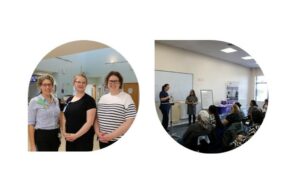
Provide exceptional care through our clinical pathways
We will develop our approach and governance systems to support the consistent provision of responsive effective care that is informed by our local population and feedback, national guidance, standards and recommendations. We will regularly review and act on local outcomes to improve our services.
Our ambition is…
- Every woman / birthing person will have early and easy access to all the required information to make an informed personalised decision on their care. Our staff will offer their support to everyone equally regarding pre-pregnancy, during pregnancy and post-delivery care.
- Ensure women / birthing people and their babies are safe in our care and avoidable harm is eliminated.
- Every woman / birthing person will have a strong relationship with our Midwifery staff and a personalised care plan depending on their wishes and circumstances. Women / birthing people will have specialist care and individualised options when required, for example for significant medical or mental health conditions, lifestyle situations or disabilities. Our Midwives and Obstetricians will offer options of care based on evidence and supported by national guidance and recommendations to ensure the best long-term outcomes for mothers and babies.
- We want every woman / birthing person to have a smooth journey with appropriate and competent care in the correct timeframe and place.
To achieve this, we will…
- Continue to support the delivery of Maternity services on both of our hospital sites, uniting the service with the integration of our community Midwifery services in the life of this strategy.
- Our Maternity services on each site will be united by the single strategy which recognises the similarities and also difference of each unit. Luton and Dunstable University Hospital will continue to deliver services of fetal and maternal medicine and as one of the three regional units with a designated Neonatal intensive care unit support the perinatal functions required for this.
- Prioritise the update and merging of our guidelines and pathways, where possible to ensure a smooth, equal, effective and responsive service within Bedfordshire Hospitals NHS Foundation Trust.
- Aim to book at least 90% of women / birthing people into the service prior to 10 weeks gestation to maximise care opportunities at an early stage.
- Increase pre-pregnancy counselling services by working with our partners within the Bedfordshire, Luton and Milton Keynes (BLMK) Integrated Care System (ICS).
- Deliver the national and local Maternity digital strategy through the implementation of an end to end EPR system, supporting safe and effective risk assessment, care planning that is always accessible for staff and birthing people
- Ensure that women / birthing people are cared for by the right person, in the right place and at the right time. Women / birthing people will all have a named Midwife providing their care and those women / birthing people who need to have care from an Obstetrician and other professionals will access this through the Antenatal clinic.
- Service users move seamlessly on their journey through other services provided by the Trust, while being treated with sensitivity and collaboratively.
- Hold early discussions with women / birthing people regarding choice of place to give birth and plan for care when choice is outside of recommendations and guidance when required.
- Hold Antenatal MDT meetings for all high risk women / birthing people with clear escalation pathways to the Maternity Medicine Network for East of England (EoE).
- Offer the same screening test (OGTT) for women / birthing people with a referral for GDM with equal care at both Luton and Bedford site.
- Support the BLMK development and implementation of Perinatal Pelvic Health service.
- We will implement best practice consistently, including Saving Babies Lives Care Bundle V3, MEWS and NEWTT in line with national recommendations.
- By year 3 recruit a specialist Midwife for multiple pregnancies at Bedford Hospital to support the delivery of effective best practice that is aligned across both our services.
- Ensure all women / birthing people have access to Mental Health support by having a specialist Midwife and Peri-mental health team on both sites.
- Embed appropriate bereavement pathways, such as our Rainbow Clinic, to offer mothers / birthing people and family’s sensitive specialised care for loss and support development of 7 day week bereavement services.
- Offer transparency and honesty when discussing and explaining complicated situations during birth and post-natal. Utilise feedback from our user stakeholders such as the MNVP and staff to co design and co-produce quality improvements that have been identified by users of our services.
- Ensure our outpatient care areas, Day Assessment Unit function effectively and that responsive and consistent pathways for women who need induction of labour are in place.
Listen to our user voice
It is vital that there is opportunity made for women / birthing people and their families to have their say about local Maternity care and feedback on not only how we can make improvements, but also what we did well.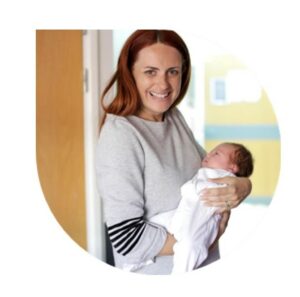
This feedback allows us to share learning and successes with our staff.
Our ambition is to…
- Work in collaboration with Maternity and Neonatal Voices Partnerships (MNVPs) and stakeholders, to hear from women / birthing people who use local Maternity services.
- Hear from those incorporating all backgrounds and with varied perspectives and experiences of care.
- Value and take on board the feedback provided by women / birthing people and their families, as well as the local community we care for, in order to drive continuous improvement in the quality of local community care.
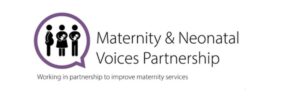
To achieve this, we will…
- Gather feedback and intelligence from our local communities through the triangulation of the following key components:
– 15 steps for Maternity: Developed by NHS England in conjunction with National Maternity Voices, 15 Steps for Maternity is a toolkit designed especially for use by MNVPs which uses an observational approach to understanding what women experience as they access local Maternity care.
– Walking the Path: Walking the Path is a great way for us to gather feedback from women / birthing people and their families currently experiencing Maternity care in the hospital or community setting.
– Mother’s Voices: These listening events for local parents and parents-to-be are run by MNVP Co-Chairs and provide an opportunity for mothers / birthing people, fathers and anyone involved in supporting women / birthing people during pregnancy, birth and the first few days with a new baby. Bedfordshire Hospitals also offers a listening service, Birth Afterthoughts Clinic as well as a Birth Options Clinic.
– Online Surveys: Surveys enable us to capture anonymous feedback from local women and their families at any time. They can be general or issue specific.
– Friends and Family Test: The Friends and Family Test is a feedback tool that offers women / birthing people and their families the opportunity to give feedback on the treatment and care they’ve received, in their own words.
– Focus Groups: When an MNVP wishes to focus on a particular topic in their plan of work a focus group may be held. Bringing together service users and clinicians with experience of a specific issue to brainstorm solutions together and co-design services.
- Build on our cultural roots to ensure all women / birthing people will receive care which is personal to their needs. For example, the development of Personalised Care Plans will enable strong relationships between women / birthing people and professionals involved in their care, and support joint decision-making based on the needs and values of each family.
- Improve early access into our Maternity services by increasing the number of women / birthing people who see their Midwife before 10 weeks of pregnancy. Early support helps to identify any problems earlier and build better relationships, resulting in a safer birth and better long-term outcomes for the parents and baby.
- Promote healthy, confident births for our women / birthing people. We want to make sure all women / birthing people give birth in the best setting for them, with the right information and care for the right birth. For many women / birthing people, giving birth at home or in a Midwifery-led unit will lead to better outcomes. For those women / birthing people who choose a Midwifery-led birth, we want to make sure this can happen. For women / birthing people who have more complex pregnancies we will make sure they have timely access to specialist advice and care from a multi-disciplinary team at all stages of pregnancy.
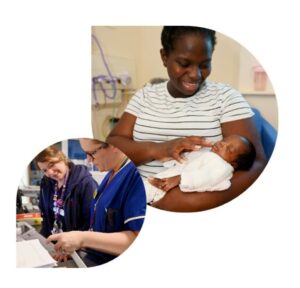
Look after our people – the Wellbeing of Staff
The wellbeing of our Maternity staff is crucial for the delivery of safe, high-quality Maternity care. The importance of looking after our staff is also highlighted in Bedfordshire Hospitals’ vision “to employ the best people and develop and value them, so that the teams they work in provide outstanding care to the local population” and the NHS People Plan and NHS Long-term Plan.

Our ambition is…
- To learn and grow from experiences, use the evidence base and examples of good practice, aligned with our Trust values and staff needs, to support the physical, emotional and spiritual wellbeing of our staff.
- Increased compassion in the workplace, promoting conditions in which our staff feel more connected and appreciated.
- To ‘care for the carers’ recognising that staff need to experience compassion and care themselves in order to deliver compassionate care to patients, and to live the values of the organisation.
To achieve this, we will…
- Utilise the Lead Professional Midwifery Advocates (PMAs) we have embedded on both our sites and progress our sessional PMA time to further build on this support mechanism (based on a minimum 1:20 ratio)
- Encourage use of the wellbeing rooms on our sites

- Promote wellbeing offers to staff on our newly launched joint intranet which include a ‘Health and Wellbeing Resource Pack’, access to our Employee Assistance Programme (Vita Health), BLMK wellbeing services, Freedom to Speak Up Guardians, Peer Listener Service, and Chaplaincy Services. We will continuously review and update the intranet as new offers are developed.
- Embed the new ‘Legacy Midwives’ roles on both sites to best support our retention plan
- Utilise the Band 4 dedicated development posts for our support staff
- Recognise staff for their outstanding work through international award programme DAISY for Registered Midwives and Registered Nurses and our locally shaped award system ROSE for all our support staff
- Continue to use and offer Hot Debriefs and After Action Reviews (AAR) to staff following incidents or events to support any learning
- Encourage engagement in Trust-wide Schwartz rounds
- Build on our Shared Decision Making councils and embed them within Maternity to aid empowering staff to create positive change
- Provide a fair and equitable training offer to all staff through our education and training pillar, we recognise the positive impact personal development has on wellbeing
- Build further on psychological safety in the workplace, and will be developing our leadership at all levels to best support this
- Explore the use of appreciative enquiry tool as a mechanism to support wellbeing

Develop our team Workforce, Training and Education
Develop a sustainable workforce to deliver safer, more personalised, kinder, professional and more family friendly Maternity services. To provide a positive learning environment where there are opportunities for individual and team development and a culture which promotes innovation and continuous learning across all professional boundaries.
Our ambition is to…
- Look after the staff who work with our women / birthing people, recognising they are our greatest resource
- Embed a positive learning environment where staff development is encouraged and fostered
- Become known as a Maternity service where staff want to stay and develop their careers

To achieve this, we will…
- Develop a sustainable workforce through attracting, developing and retaining people with the skills, competencies and values to deliver local and nationally aligned Maternity objectives
- Work with local and corporate teams to consistently improve recruitment and experiences of our staff
- Have an informed workforce plan that supports responsive and safe recruitment and the ongoing working practices of permanent and temporary staff
- Ensure inclusion of all staff from all disciplines within Maternity
- Enhance and further develop the experience of our internationally educated staff members, staff new to post and those returning to work
- Deliver a comprehensive orientation that includes individualisation of their own learning requirements and clinical experiences and be supported with the guidance required from mentors, practice development teams and preceptors and clinical supervisors.
- Value and invest in our staff by promoting equitable access and opportunity for education, training, and development and leadership development opportunities for all staff
- Invest in the development opportunities for our staff and students, focusing on topics to consistently delivery safe, effective, responsive, caring and well led Maternity services, taking steps to increase visibility of senior staff and enable our people to attend training in support of their development
- Embed a culture of learning, research and continuous improvement throughout our services, ensuring our Maternity staff training is aligned with national policy and recommendations and responsive to local governance outcomes from audit, feedback from staff and families and investigations.
- Ensure recording of all training is owned and visible to local Managers through the Trusts ESR training records
- Build a safety culture, underpinned by civility and psychologically safe teams, sharing and embedding safety learning and talking about the things that go right as well as the things that go wrong for people using our services and care
- Support appraisal and workforce patterns that will be responsive to ensure the delivery of safe, effective Maternity services
- Foster the development of strong leadership at every level of our services, focusing on learning and sharing good practice and multi-professional team working and education
- Support leaders at all levels through development activities and opportunities
- Continue to develop Quality Improvement skills to actively seek out, measure and use the correct data to identify and embed change that lasts and make a difference
- Continue to build the learning and education offers with peers across our ICB, neighbouring organisations and regionally
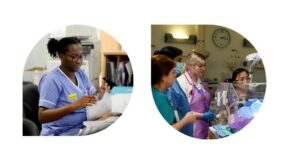
How will we measure success
To measure the progress against this strategy we set out a range of metrics linked to our priorities that we will endeavour to meet.
Pillar One – Be responsive in our promotion of Equality, Diversity and Inclusion
Improve the quality of our information that is available and ensure women / birthing people and staff have access to a suite of effective translation options to support informed consent.
Develop and embed roles such as the Close Relative Marriage Midwife and ensure our staff receive the training and support needed to deliver response care.
Pillar Two – Provide exceptional patient care through our Clinical Pathways (The Maternity Journey)
Every woman / birthing person will have early and easy access to all the required information to make an informed personalised decision on their care.
Implement and embed the Perinatal Pelvic Health service as part of the BLMK system development.
Pillar Three – Listen to our User Voice
Aim to maintain a minimum 90% of patients who are likely to recommend our Maternity service to friends and family (captured at four points: antenatal care, birth, postnatal ward and postnatal community).
Women / birthing people will have personalised care plans in place and women / birthing people report that they are involved in decisions about their care.
Pillar Four – Look after our people through a focus on Staff Wellbeing
- Utilise the Lead Professional Midwifery Advocates (PMAs) we have embedded on both our sites and progress our sessional PMA time to further build on this support mechanism (based on a minimum 1:20 ratio).
- Continue to use and offer Hot Debriefs and After Action Reviews (AAR) to staff following incidents or events to support any learning.
Pillar Five – Develop our team within a positive practice environment where staff development is encouraged through Workforce Training and Education
- Enhance and further develop the experience of our internationally educated staff members, staff new to post and those returning to work.
- Support appraisal and workforce patterns that will be responsive to ensure the delivery of safe, effective Maternity services.

